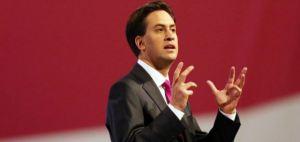 Those with long memories will recall how Tony Blair was welcomed like the returning Messiah by a mainly black audience at Ruach Ministries church in Brixton towards the end of his Downing Street reign, while everyone else just regarded him as a very naughty boy.
Those with long memories will recall how Tony Blair was welcomed like the returning Messiah by a mainly black audience at Ruach Ministries church in Brixton towards the end of his Downing Street reign, while everyone else just regarded him as a very naughty boy.
Labour leader Ed Miliband has a very long way to emulate anything like that kind of adulation. Despite keeping his audience waiting for almost an hour before arriving to deliver what was billed as a speech on race equality, the anticipation clearly had not built up to fever pitch. The polite but far from enthusiastic reception hardly measured on the Richter scale, and indication that even in front of audiences representing the most loyal sections of society he still has a lot to do to convince that he has star quality.
Miliband had come to talk about Black History Month. And to be fair it got a couple of mentions, one prompted by an audience question. But mostly it was standard Labour sales pitch on the NHS, housing, and the bedroom tax of the kind that Andrew’s Neil and Marr itch to interrupt to shift the debate to more challenging questions. About two thirds of audience questions fell straight into Miliband’s comfort zone – perhaps the result of host Pat Reid thrice instructing us to “ask positive questions” and not “moan and groan about what’s wrong.” But whenever an awkward question came a brief moment of awkwardness hung in the air.
Miliband paid tribute to the Class of ’87 – Diane Abbott, the late Bernie Grant, Paul Boateng and Keith Vaz – but when veteran activist Marc Wadsworth said his role as chair of the Labour Party Black Sections had delivered that breakthrough, Miliband scratched his neck and momentarily grimaced. Wadsworth went on to ask for all-black shortlists in party selections, but Miliband fudged by saying “let’s have the debate, let’s not rule it out.” The trouble is not getting all-black lists while not ruling it out is just as bad as ruling it out in the first place.
Another audience member asked him about school exclusions. “I’m happy to look at that”, Ed responded before somehow turning the subject matter to Chuka Umunna (“we need people like him”). Another person asked him to support reparations for slavery. “I completely understand where you’re coming from and those issues must be acknowledged”, he said, not exactly answering the question.
The one specific on race equality we did get from Miliband, which he promised was an exclusive to those present, was a commitment that the next Labour government would, in its’ first year, require every government department to have a race equality plan. “This covers stop and search, the judiciary, ethnic minority representation on the boards of big companies and lots of other areas”, he said with pride. This is indeed good news, although not so exclusive to the smaller number who had heard a speech by shadow justice secretary Sadiq Khan two or three months earlier. The trouble was there were no specifics from Miliband about particular changes he wanted to see.
Yes, he clearly wanted more race equality (although he stopped shy of repeating Khan’s pledge that Labour would put race equality “at the heart” of decision-making”), but I wanted to know, beyond those encouraging sentiments, what specific policies he actually wanted to see. Would he change the law to allow affirmative action or not? How would be deal with issues like disproportionate BAME unemployment? I guess we’ll just have to wait for the Whitehall mandarins to work it out on Miliband’s behalf.
Having witnessed Khan’s speech it was clear this member of the team had a firm grasp on the detail. It was disappointing that his boss Miliband was comparatively light on the specifics. You felt that if Umunna or Khan were leader there would be a lot more detail forthcoming. But Miliband got away with it. Indeed most questions were non-race specific, reflecting the fact that the black community care about mainstream issues every bit as much as other voters, but given the billing I was disappointed that more people didn’t grill him on the detail of his race equality plans.
Miliband ended the event – which was organised by Croydon BME Forum and Operation Black Vote – by saying: “I accept that injustices in particular, and not just in general, cannot be reduced simply to class; that’s why you’ve got to look at race equality across the board… and there’s a lot of witnesses here, I’m sure you’d hold me to account!” The trouble was there wasn’t all that much to hold him to account over. Once civil servants have knocked up a race equality strategy for his department, no matter how weak, he will have fulfilled his one commitment to the meeting tonight. Hardly taxing.
Thankfully, as an observer of Labour moves on this subject I happen to know there’s a lot more going on. The race equality consultation, and Khan’s work on the issue, is being followed up by junior front benchers on individual areas. Labour do appear to be gearing up to make a series of efforts to combat comparative racial disadvantage, and this should be a wake-up call to other parties to match or better Labour’s stance. It’s just a shame that Miliband himself believes he can coast along spouting generalities. There was a lack of passion and a lack of detail, and that doesn’t bode well for the future.
By Lester Holloway @brolezholloway
